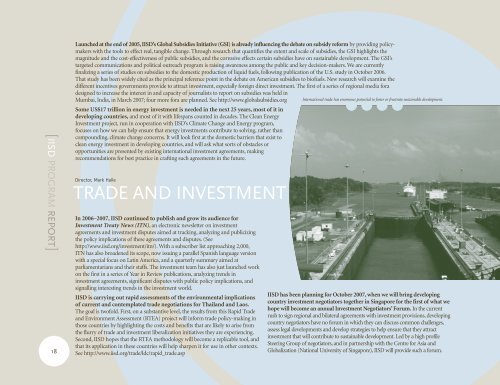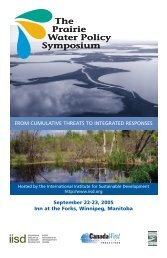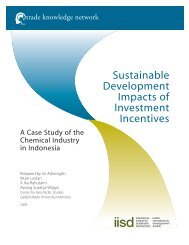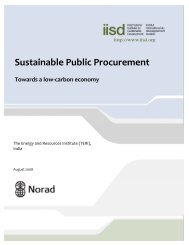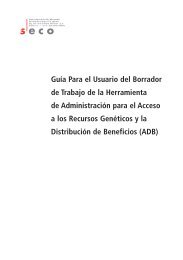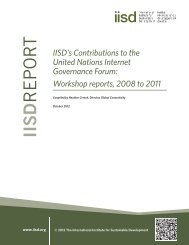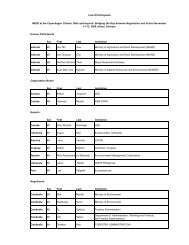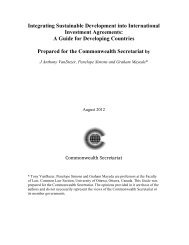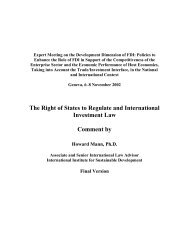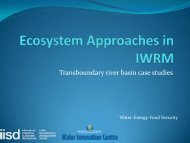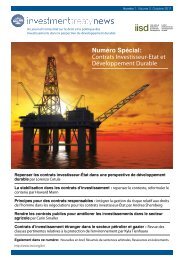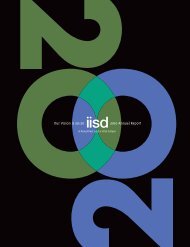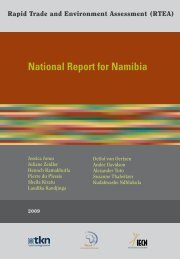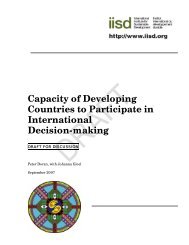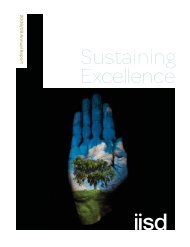2006/2007 Annual Report - International Institute for Sustainable ...
2006/2007 Annual Report - International Institute for Sustainable ...
2006/2007 Annual Report - International Institute for Sustainable ...
You also want an ePaper? Increase the reach of your titles
YUMPU automatically turns print PDFs into web optimized ePapers that Google loves.
[IISD PROGRAM REPORT]<br />
18<br />
Launched at the end of 2005, IISD’s Global Subsidies Initiative (GSI) is already influencing the debate on subsidy re<strong>for</strong>m by providing policymakers<br />
with the tools to effect real, tangible change. Through research that quantifies the extent and scale of subsidies, the GSI highlights the<br />
magnitude and the cost-effectiveness of public subsidies, and the corrosive effects certain subsidies have on sustainable development. The GSI’s<br />
targeted communications and political outreach program is raising awareness among the public and key decision-makers. We are currently<br />
finalizing a series of studies on subsidies to the domestic production of liquid fuels, following publication of the U.S. study in October <strong>2006</strong>.<br />
That study has been widely cited as the principal reference point in the debate on American subsidies to biofuels. New research will examine the<br />
different incentives governments provide to attract investment, especially <strong>for</strong>eign direct investment. The first of a series of regional media <strong>for</strong>a<br />
designed to increase the interest in and capacity of journalists to report on subsidies was held in<br />
Mumbai, India, in March <strong>2007</strong>; four more <strong>for</strong>a are planned. See http://www.globalsubsidies.org<br />
Some US$17 trillion in energy investment is needed in the next 25 years, most of it in<br />
developing countries, and most of it with lifespans counted in decades. The Clean Energy<br />
Investment project, run in cooperation with IISD’s Climate Change and Energy program,<br />
focuses on how we can help ensure that energy investments contribute to solving, rather than<br />
compounding, climate change concerns. It will look first at the domestic barriers that exist to<br />
clean energy investment in developing countries, and will ask what sorts of obstacles or<br />
opportunities are presented by existing international investment agreements, making<br />
recommendations <strong>for</strong> best practice in crafting such agreements in the future.<br />
Director, Mark Halle<br />
TRADE AND INVESTMENT<br />
In <strong>2006</strong>–<strong>2007</strong>, IISD continued to publish and grow its audience <strong>for</strong><br />
Investment Treaty News (ITN), an electronic newsletter on investment<br />
agreements and investment disputes aimed at tracking, analyzing and publicizing<br />
the policy implications of these agreements and disputes. (See<br />
http://www.iisd.org/investment/itn/). With a subscriber list approaching 2,000,<br />
ITN has also broadened its scope, now issuing a parallel Spanish language version<br />
with a special focus on Latin America, and a quarterly summary aimed at<br />
parliamentarians and their staffs. The investment team has also just launched work<br />
on the first in a series of Year in Review publications, analyzing trends in<br />
investment agreements, significant disputes with public policy implications, and<br />
signalling interesting trends in the investment world.<br />
IISD is carrying out rapid assessments of the environmental implications<br />
of current and contemplated trade negotiations <strong>for</strong> Thailand and Laos.<br />
The goal is twofold. First, on a substantive level, the results from this Rapid Trade<br />
and Environment Assessment (RTEA) project will in<strong>for</strong>m trade policy-making in<br />
those countries by highlighting the costs and benefits that are likely to arise from<br />
the flurry of trade and investment liberalization initiatives they are experiencing.<br />
Second, IISD hopes that the RTEA methodology will become a replicable tool, and<br />
that its application in these countries will help sharpen it <strong>for</strong> use in other contexts.<br />
See http://www.iisd.org/trade/ldc/rapid_trade.asp<br />
<strong>International</strong> trade has enormous potential to foster or frustrate sustainable development.<br />
iStockphoto<br />
IISD has been planning <strong>for</strong> October <strong>2007</strong>, when we will bring developing<br />
country investment negotiators together in Singapore <strong>for</strong> the first of what we<br />
hope will become an annual Investment Negotiators’ Forum. In the current<br />
rush to sign regional and bilateral agreements with investment provisions, developing<br />
country negotiators have no <strong>for</strong>um in which they can discuss common challenges,<br />
assess legal developments and develop strategies to help ensure that they attract<br />
investment that will contribute to sustainable development. Led by a high profile<br />
Steering Group of negotiators, and in partnership with the Centre <strong>for</strong> Asia and<br />
Globalization (National University of Singapore), IISD will provide such a <strong>for</strong>um.


